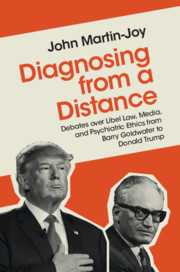 Diagnosing from a Distance
Diagnosing from a Distance Book contents
- Diagnosing from a Distance
- Diagnosing from a Distance
- Copyright page
- Dedication
- Contents
- About the Author
- Acknowledgments
- Abbreviations
- Introduction An Ethical Dilemma
- Chapter 1 Psychoanalysis, Media, and Politics from the Rise of Hitler to the 1950s
- Part I Diagnosis from a Distance and Libel Law in the 1960s: Goldwater v. Ginzburg
- Part II Professionalization and the Rise of the Goldwater Rule
- Chapter 5 “To Protect Public Figures”
- Chapter 6 The CIA and the White House
- Chapter 7 Furor
- Conclusion On History, Ethics, and Pluralism
- Appendix The Goldwater Rule in 1973 and Today
- Photographs of Key People and Events
- Notes
- Works Cited
- Index
Chapter 7 - Furor
The Debate over Donald Trump
from Part II - Professionalization and the Rise of the Goldwater Rule
Published online by Cambridge University Press: 29 February 2020
- Diagnosing from a Distance
- Diagnosing from a Distance
- Copyright page
- Dedication
- Contents
- About the Author
- Acknowledgments
- Abbreviations
- Introduction An Ethical Dilemma
- Chapter 1 Psychoanalysis, Media, and Politics from the Rise of Hitler to the 1950s
- Part I Diagnosis from a Distance and Libel Law in the 1960s: Goldwater v. Ginzburg
- Part II Professionalization and the Rise of the Goldwater Rule
- Chapter 5 “To Protect Public Figures”
- Chapter 6 The CIA and the White House
- Chapter 7 Furor
- Conclusion On History, Ethics, and Pluralism
- Appendix The Goldwater Rule in 1973 and Today
- Photographs of Key People and Events
- Notes
- Works Cited
- Index
Summary
This chapter examines the controversy over psychiatric comment on Donald Trump. In 2016, Trump’s election led many psychiatrists to grow concerned for the country’s safety and to argue that when the country is unsafe, commenting on a public figure’s mental health is in fact an ethical obligation. The APA, on the other hand, held firm to and even strengthened its ban on such comment. For my narrative and analysis, I draw on original interviews with APA officials – including medical director Saul Levin and ethics chair Rebecca Brendel – and with critics of the APA, including Bandy X. Lee, Judith Herman, Robert Jay Lifton, and Leonard Glass. Using this new material and looking at the age of Twitter, this chapter presents the first sustained analysis of the controversy and its importance for psychiatry, ethics, and journalism in the age of Trump. As I note, in recent years, several prominent figures have argued for a revision of the libel standard articulated in New York Times v. Sullivan. These figures include the late Justice Antonin Scalia, current Justice Clarence Thomas, and President Donald Trump himself – leaving the future of libel law contested, as it has been since 1964.
Keywords
- Type
- Chapter
- Information
- Diagnosing from a DistanceDebates over Libel Law, Media, and Psychiatric Ethics from Barry Goldwater to Donald Trump, pp. 192 - 223Publisher: Cambridge University PressPrint publication year: 2020


